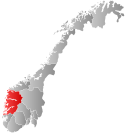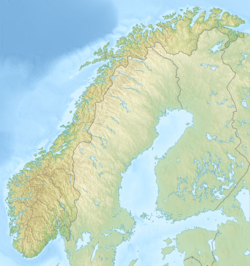
Back Bergen Afrikaans Bergen (Norwegen) ALS በርግን Amharic Bergen (Noruega) AN برغن Arabic برجن ARZ Bergen AST Bergen Azerbaijani برقن AZB Bergens BAT-SMG
Bergen | |
|---|---|
City and municipality | |
|
| |
| Coordinates: 60°23′22″N 5°19′48″E / 60.38944°N 5.33000°E | |
| Country | |
| Region | Western Norway |
| County | Vestland |
| District | Midhordland |
| Municipality | Bergen |
| Established | before 1070 |
| Government | |
| • Mayor | Marit Warncke (H) |
| • Governing mayor | Christine B. Meyer (H) |
| Area | |
| • City and municipality | 464.71 km2 (179.43 sq mi) |
| • Land | 444.99 km2 (171.81 sq mi) |
| • Water | 19.72 km2 (7.61 sq mi) 4.2% |
| • Urban | 94.03 km2 (36.31 sq mi) |
| • Metro | 2,755 km2 (1,064 sq mi) |
| Highest elevation | 987 m (3,238 ft) |
| Lowest elevation | 0 m (0 ft) |
| Population (30 September 2023) | |
| • City and municipality | 291,189 |
| • Metro | 469,238 |
| Demonym | Bergenser/Bergensar |
| GDP | |
| • Total | €32.086 billion (2020) |
| Postal code | 5003–5268 (P.O.box 5802–5899) |
| Area code | (+47) 5556 |
| Website | www |
| Bergen kommune | |
 Vestland within Norway | |
| Country | Norway |
| County | Vestland |
| District | Midhordland |
| Established | 1 January 1838 |
| • Created as | Formannskapsdistrikt |
| Administrative centre | Bergen |
| Official language | |
| • Norwegian form | Neutral |
| ISO 3166 code | NO-4601[3] |
Bergen (Norwegian pronunciation: [ˈbæ̀rɡn̩] ), historically Bjørgvin, is a city and municipality in Vestland county on the west coast of Norway. As of 2022[update], its population was roughly 289,330.[4] Bergen is the second-largest city in Norway after national capital Oslo. The municipality covers 465 square kilometres (180 sq mi) and is located on the peninsula of Bergenshalvøyen. The city centre and northern neighbourhoods are on Byfjorden, 'the city fjord'. The city is surrounded by mountains, causing Bergen to be called the "city of seven mountains". Many of the extra-municipal suburbs are on islands. Bergen is the administrative centre of Vestland county. The city consists of eight boroughs: Arna, Bergenhus, Fana, Fyllingsdalen, Laksevåg, Ytrebygda, Årstad, and Åsane.
Trading in Bergen may have started as early as the 1020s. According to tradition, the city was founded in 1070 by King Olav Kyrre and was named Bjørgvin, 'the green meadow among the mountains'. It served as Norway's capital in the 13th century, and from the end of the 13th century became a bureau city of the Hanseatic League. Until 1789, Bergen enjoyed exclusive rights to mediate trade between Northern Norway and abroad, and it was the largest city in Norway until the 1830s when it was overtaken by the capital, Christiania (now known as Oslo). What remains of the quays, Bryggen, is a World Heritage Site. The city was hit by numerous fires over the years. The Bergen School of Meteorology was developed at the Geophysical Institute starting in 1917, the Norwegian School of Economics was founded in 1936, and the University of Bergen in 1946. From 1831 to 1972, Bergen was its own county. In 1972 the municipality absorbed four surrounding municipalities and became a part of Hordaland county.
The city is an international centre for aquaculture, shipping, the offshore petroleum industry and subsea technology, and a national centre for higher education, media, tourism and finance. Bergen Port is Norway's busiest in terms of both freight and passengers, with over 300 cruise ship calls a year bringing nearly a half a million passengers to Bergen,[5] a number that has doubled in 10 years.[6] Almost half of the passengers are German or British.[6] The city's main football team is SK Brann and a unique tradition of the city is the buekorps, which are traditional marching neighbourhood youth organisations. Natives speak a distinct dialect, known as Bergensk. The city features Bergen Airport, Flesland and Bergen Light Rail, and is the terminus of the Bergen Line. Four large bridges connect Bergen to its suburban municipalities.
Bergen has a mild winter climate, though with significant precipitation. From December to March, Bergen can, in rare cases, be up to 20 °C (36 °F) warmer than Oslo, even though both cities are at about 60° North. In summer however, Bergen is several degrees cooler than Oslo due to the same maritime effects. The Gulf Stream keeps the sea relatively warm, considering the latitude, and the mountains protect the city from cold winds from the north, north-east and east.
- ^ "Gross domestic product (GDP) at current market prices by metropolitan regions". ec.europa.eu.
- ^ "Forskrift om målvedtak i kommunar og fylkeskommunar" (in Norwegian). Lovdata.no.
- ^ Bolstad, Erik; Thorsnæs, Geir, eds. (26 January 2023). "Kommunenummer". Store norske leksikon (in Norwegian). Kunnskapsforlaget.
- ^ "Folketall per 1. januar 2022" (in Norwegian Bokmål). SSB. 19 May 2021. Retrieved 10 August 2022.
- ^ Heggemsnes, Nils (26 September 2012). "Bergen Havn". Store norske leksikon (in Norwegian Bokmål). Retrieved 8 January 2016.
- ^ a b "Cruisestatistikk". Cruise (in Norwegian Bokmål). Port of Bergen. 2016. Archived from the original on 26 May 2015. Retrieved 8 January 2016.
© MMXXIII Rich X Search. We shall prevail. All rights reserved. Rich X Search










